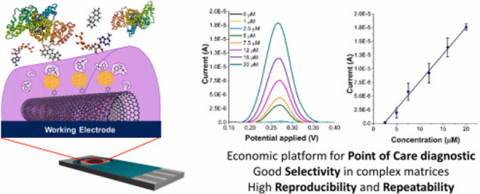Serotonin concentration in peripherical biological fluids is correlated with the insurgence of several pathologies and represents valuable information on the human physical and mental state of health. Rapid, portable, and reliable electrochemical sensors can mine this useful information in real-time and in situ. However, the main challenge that hampers their implementation is the poor operational stability in biological fluids rich in bio-macromolecules, which can induce the fouling of the electrode altering or invalidating the analytical performance of the sensor. Herein, we propose the design of a reliable and robust voltammetric sensor for detecting serotonin in plasma. The sensor is based on multiwall carbon nanotubes modified with ligand-free gold nanoparticles obtained by metal vapor synthesis, which can efficiently catalyze the oxidation of serotonin. A thin layer of molecular imprinted polymer is added to provide selectivity and antifouling properties to the sensor. By applying a design of the experiment, to optimize the experimental condition of the differential pulsed voltammetry, and adsorptive stripping to selectively pre-accumulate serotonin in the artificial receptor, we achieved serotonin detection in plasma with sensitivity (6.7 μA μmol L−1 cm−2) and limits of detection (1.0 μmol L−1) comparable to those registered in phosphate buffer solution.

05/12/2024
Design and optimization of an electrochemical sensor based on carbon nanotubes for the reliable voltammetric detection of serotonin in complex biological fluids
Title: Design and optimization of an electrochemical sensor based on carbon nanotubes for the reliable voltammetric detection of serotonin in complex biological fluids
Journal: Carbon 2024. DOI: 10.1016/j.carbon.2024.119550
